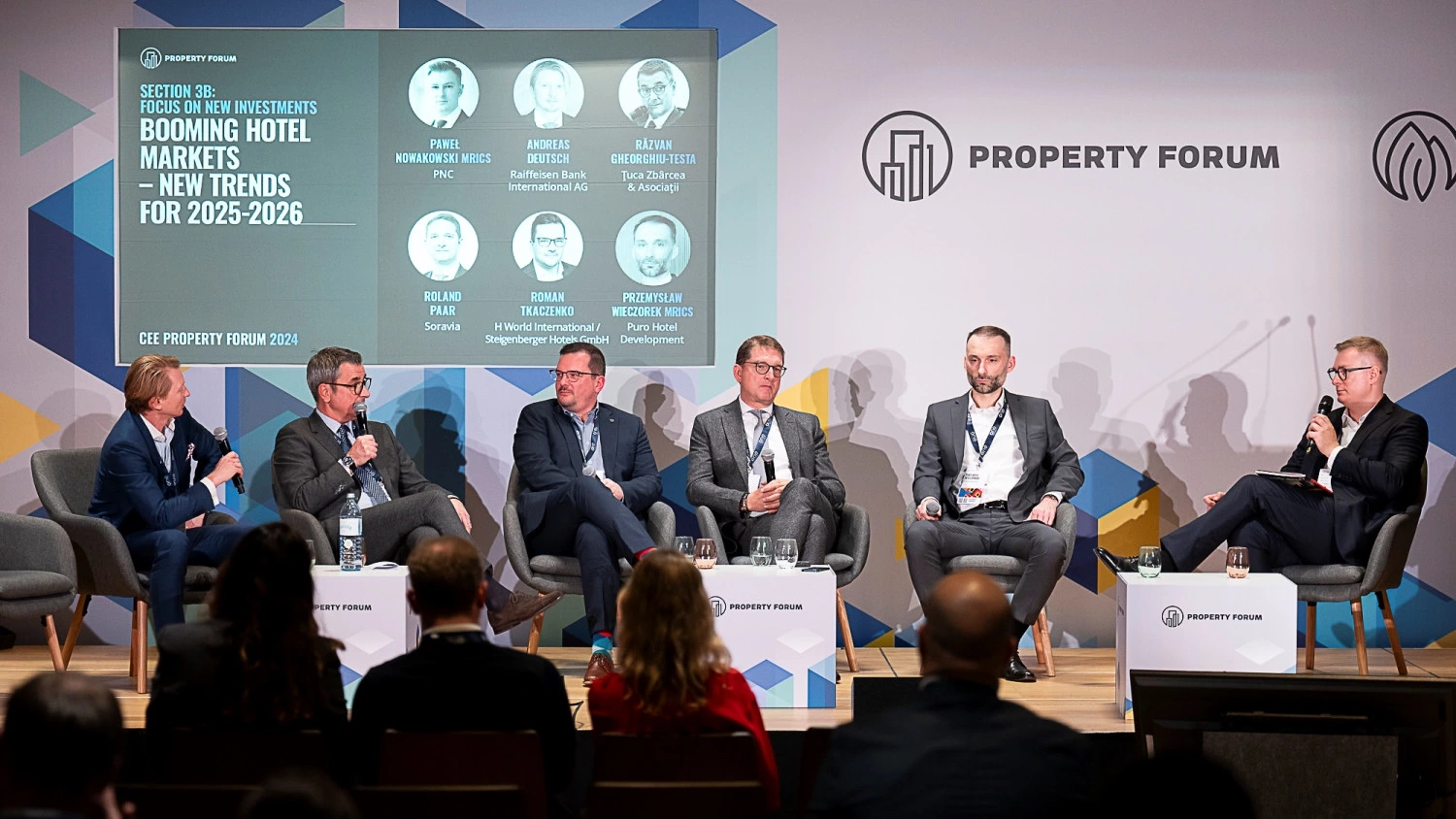
Despite the improving performance, inflation and financing costs remain significant challenges in the hospitality sector in CEE. However, reduced interest rates, stabilised construction costs, and strong recovery in midscale and budget segments may stimulate investment, panellists stressed at CEE Property Forum 2024 in Vienna.
Experts of the panel, chaired by Paweł Nowakowski MRICS, Founder & CEO, PNC were overwhelmingly positive on the latest trends in the hospitality sector which witnesses pre-Covid figures in nearly every Key Performance Indicator. The sector is on track again compared to the hard first two years after the pandemic. Revenge travel is up but they admitted that unlike in 2023 the segment had no chance to see double-digit ADR growth this year.
Andreas Deutsch, Deputy Head of Department, Asset Lead Hospitality | Real Estate Finance, Raiffeisen Bank International AG set the tone by saying that the quick growth of GDP and exposable personal income in CEE as well as the strengthening US dollar are boosting demand for different types of hotel products. The market favours budget and mid-scale lifestyle projects, with conversions of office buildings into hotels being a popular trend.
Roland Paar, Head of Hotel Investment, Soravia noted however that costs tend to increase permanently narrowing margins in all categories, except the luxury. He said some markets are illiquid and that hampers development. He cited Hungary as a bad and risky business environment for international players as they may lose out to locals, supported by the Hungarian government.
Agreeing with him Przemysław Wieczorek MRICS, President of the Management Board, Puro Hotel Development said that financing costs are still much lower in the Eurozone compared to CEE making international developers start projects only in upscale and luxury categories. High operational costs in the region also became a barrier to step over, he added.
Observing market trends Mr Paar noticed that young travellers do not need full-service accommodation. Budget tourists also include seniors with middle-range income, both are happy to stay in Motel One-type hotels in city centres, he argued. Mr Wieczorek highlighted the importance of the experience all visitors need in a hotel, meaning that local travel suggestions and personalised in-house services would be pivotal to attracting tourists in greater numbers. The exception is the hotel’s restaurant which is no longer a magnet as the majority of guests explore the much bigger offer outside the building.
Răzvan Gheorghiu-Testa, Partner - Co-Head of Real Estate Practice Group, Ţuca Zbârcea & Asociaţii spoke about the attitude of big international hotel chains in Romania. He acknowledged that unlike Budapest, Prague or Vienna the capital of Romania is not a tourist destination and only business hotels have a chance to show good performance. Citing Hyatt’s entering the local market he said that they had chosen Brasow in the busy Carpathian mountains area for the beginning and had used a franchise agreement as a form of the operation.
No clear winner was announced during this panel in the competition of operating models.
Some panellists were in favour of the management agreement which they said was prefered by banks. For instance, Roman Tkaczenko, Development Director, H World International / Steigenberger Hotels GmbH said partners in the banking sector are positive for lending if an operator presents a takeover plan and opts for a management deal. Mr Paar said a lease is not suitable in CEE as is considered riskier compared to other forms of running a hotel. Andreas Deutsch was also against the lease form as „it gives a false feeling of stability”. Franchise agreements are also possible but used in fewer cases in the region, experts added.
The final topic was the most efficient way of a hotel development. All participants noted that everything depends on the local physical, legal and economic conditions. Greenfield development is rare in the city centres and is subject to the availability of empty plots or easy demolishing of an old building. Conversion of office buildings is gaining ground but the market has only a few examples compared to the US where a growing number of offices will change their purpose and developers will enjoy some federal or local governmental support in financing those conversions.
Rebranding is a popular trend in the sector and big international chains are the frontrunners in that process. Mr Paar noted however that due to heritage protection in some cases, conversions can be limited which makes investors and developers reassess their plans. Speakers also mentioned the lack of forward funding and purchasing. They said that financing is a problematic and lengthy process as banks are very cautious and show a wait-and-see approach.



